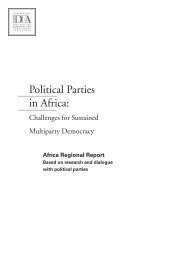Background Document - Danish Institute for Parties and Democracy
Background Document - Danish Institute for Parties and Democracy
Background Document - Danish Institute for Parties and Democracy
Create successful ePaper yourself
Turn your PDF publications into a flip-book with our unique Google optimized e-Paper software.
ing able to keep up with <strong>and</strong> ‘being disconnected from young people’. 5<br />
Indeed, the optimistic voices do not see any threat to the future of democracy but<br />
rather a revival <strong>and</strong> a renewal of democracy due to the diversity of political action that<br />
the political parties have to grapple with. These in<strong>for</strong>mal political actions create new<br />
modes of expression <strong>and</strong> participation that seem to appeal to young people. The new<br />
modes would be elite challenging <strong>for</strong>ms of participation. They would, <strong>for</strong> instance,<br />
focus on single issues or what Norris calls a ‘cause-oriented style of politics’ 6 , or what<br />
Giddens calls lifestyle politics. Others mention other <strong>for</strong>ms such as the rise of networks,<br />
issue associations <strong>and</strong> lifestyle coalitions.<br />
Overall, the combined optimistic <strong>and</strong> pessimistic voices would point to an inadequacy<br />
of traditional democratic arrangements <strong>for</strong> contemporary youth.<br />
Beyond the two voices conceptualising young people’s attitudes <strong>and</strong> behaviours<br />
towards politics there are factors that determine their engagement. Major research<br />
in the USA shows that those who get involved in the new/in<strong>for</strong>mal <strong>for</strong>ms of political<br />
engagement are those who are also more likely to get involved in <strong>for</strong>mal <strong>for</strong>ms of political<br />
engagement. In other words, young people who show political apathy in getting<br />
involved in <strong>for</strong>mal political actions are also impossible to reach through other means<br />
of political action.<br />
Indeed, factors which determine political engagement are linked to education <strong>and</strong><br />
overall social status <strong>and</strong> social economic background. The higher the education, the<br />
higher the political involvement of the parents, <strong>and</strong> the higher the social economic<br />
background of the parents, the more likely young people will engage in politics,<br />
whether <strong>for</strong>mal or in<strong>for</strong>mal.<br />
Other factors would be the multiple challenges young people have to face nowadays<br />
which may have an impact on their political attitudes <strong>and</strong> behaviour. Young people<br />
‘have to cope with dynamic social conditions during their transition to adulthood,<br />
which confront them with increasing dem<strong>and</strong>s <strong>for</strong> flexibility on the labour market,<br />
with self-reliance concerning welfare security, <strong>and</strong> with dem<strong>and</strong>s <strong>for</strong> increasing activity<br />
with respect to participation in the democratic process’. 7<br />
Although the political engagement of young women is not weaker than that of<br />
men, it is nonetheless different. Young women tend to be less involved in <strong>for</strong>mal politics<br />
<strong>and</strong> more involved in the in<strong>for</strong>mal ‘civic <strong>for</strong>m of engagement’, such as socialmovement-oriented<br />
activities, that are <strong>for</strong> instance voluntary work, collecting money,<br />
<strong>and</strong> collecting signatures, <strong>and</strong> it seems also that ‘youth participation in politics using<br />
the new technology continues to be structured by gender’ in the same way. 8<br />
There are varying factors to explain the difference. Due to the burden of duties<br />
such as caring commitments, household domestic duties, but also the requirement<br />
of the full participation in the workplace which involves working long hours, young<br />
women would lack opportunities <strong>and</strong> resources to fully engage in <strong>for</strong>mal politics. In<br />
fact, a parallel could be made between women having a late entrance in professional<br />
careers due to their other domestic/caring commitments <strong>and</strong> women entering the<br />
political scene late <strong>for</strong> the same reasons. However, they are nonetheless a huge political<br />
<strong>for</strong>ce.<br />
Another factor that could contribute to explaining the difference of interest in<br />
politics is women’s socialisation. Women’s political socialisation is ‘understood here<br />
as the process whereby they internalise the view that politics is a man’s world’. 9 A study<br />
of junior high school students found a significant gender gap in political interest in<br />
the United States. Boys had more interest in politics <strong>and</strong> boys <strong>and</strong> girls did perceive<br />
politics as something that held greater interest <strong>for</strong> boys. Except <strong>for</strong> Finl<strong>and</strong> where<br />
5 Carnegie UK Trust, 2008b, 14<br />
6 in, Odegard <strong>and</strong> Berglund, 2008, 594<br />
7 Gaiser <strong>and</strong> Rijke, 2008, 542<br />
8 Cicognani et al., 2012, 562<br />
9 Gidengil et al., 2010, 335<br />
WOMEN IN POLITICS DANISH INSTITUTE FOR PARTIES AND DEMOCRACY PAGE 13
















